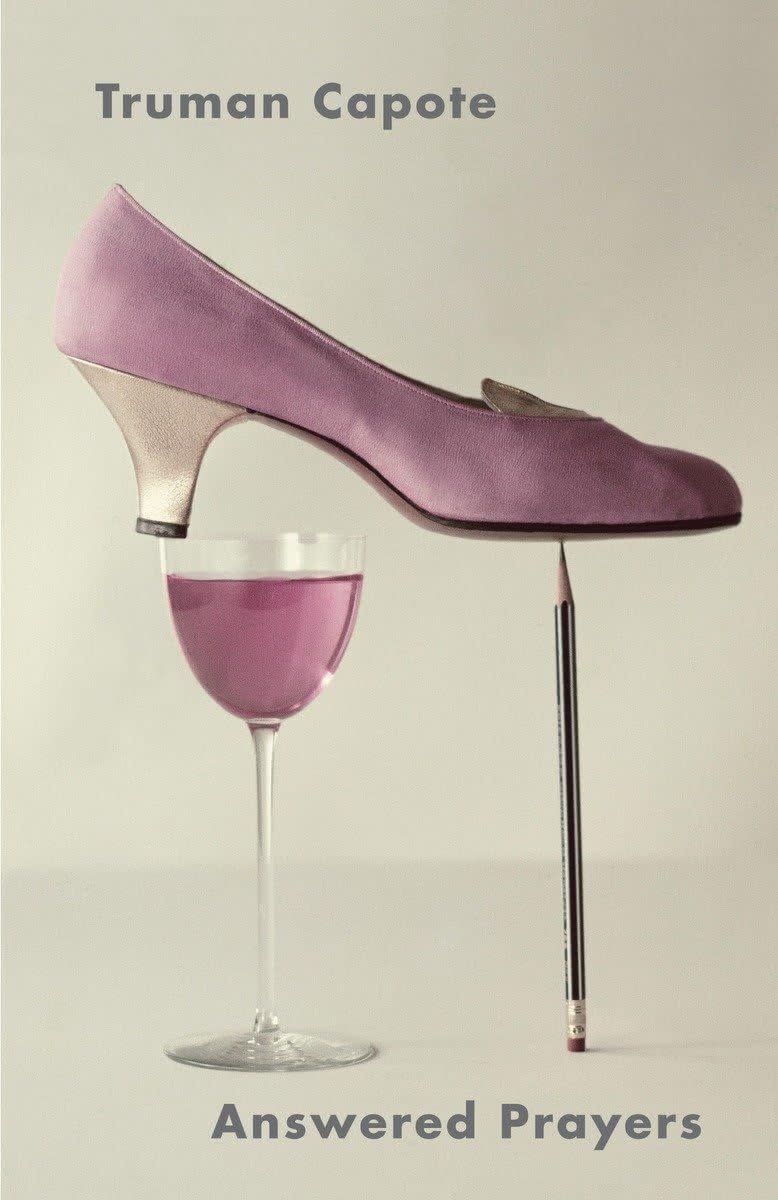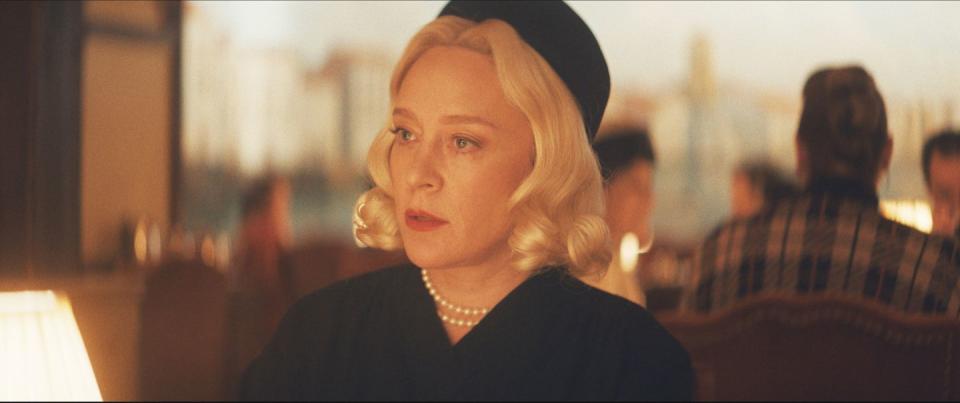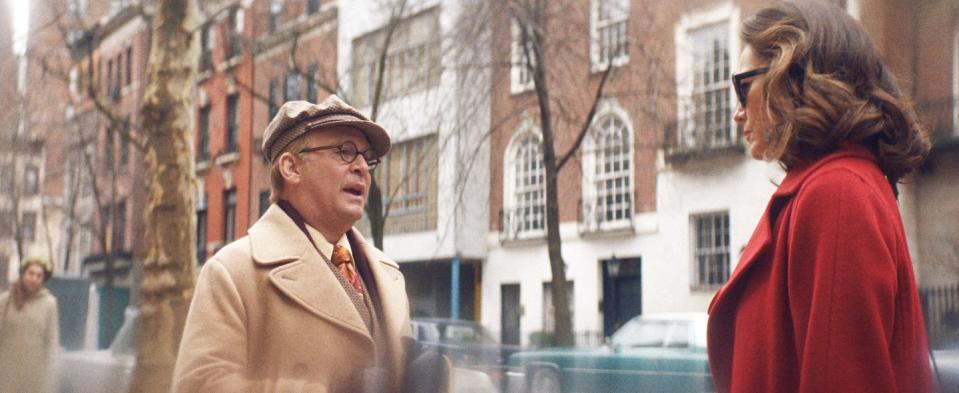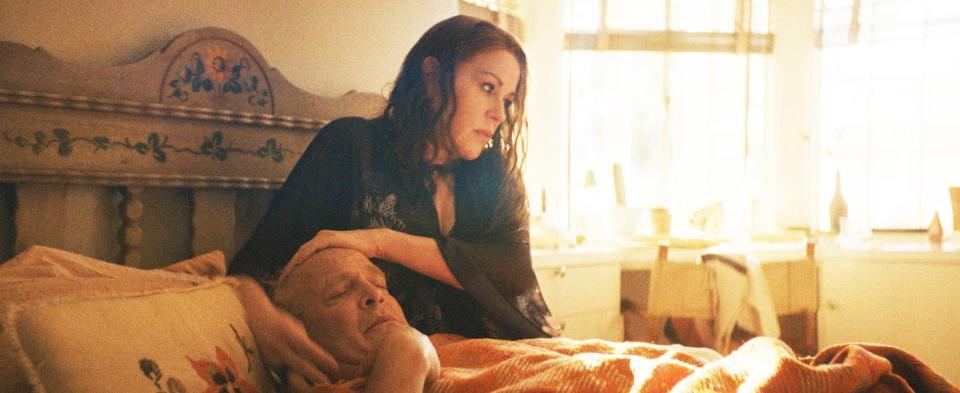The Finale of 'Feud: Capote vs. The Swans' Is a Beautiful Tragedy
- Oops!Something went wrong.Please try again later.
- Oops!Something went wrong.Please try again later.
"Hearst Magazines and Yahoo may earn commission or revenue on some items through these links."
In Wednesday night's finale of Feud: Capote vs. The Swans, Truman Capote dies while thinking of Babe Paley, his beloved Swan and former best friend. It’s been nine years since he spoke with Paley—she cut him off after Capote’s story, “La Côte Basque,1965,” published in Esquire. Even in his final moments, she’s the only thing on his mind.
Episode 8, aptly titled “Phantasm Forgiveness,” is a trippy, time-traveling hour of television that jumps between the past, present, and future to clear Capote’s conscience. It’s tragic—and comforting, somehow—that their last thoughts are of each other. Capote doesn’t know it, but Paley thinks of him, too, when she dies in episode 7. Though the words are never spoken aloud, Feud makes it clear that neither Capote nor Paley want to fight at all. When the finale comes around, it’s too late to apologize—but that doesn’t stop Capote from trying.
The finale begins with Capote visiting Paley’s grave. To his surprise, someone left her a gift. “Oh, for fuck's sake, carnations!” he exclaims. “Who would dare?” Capote pushes them aside and leaves Paley’s favorite flowers in their place. “Everything’s frigid without you,” he says, while touching her headstone. “Is it better in there?”
While at Paley’s grave, Capote celebrates his sobriety, but the visit prompts him to drink. Again. Later that evening, he arrives at his ex, Jack Dunphy's apartment, drunkenly knocking on the door. Dunphy’s new boyfriend lets him in, and—during a very awkward dining-room conversation!—Capote announces his next move. He’s going to finish his book, Answered Prayers, as an apology to The Swans. The only issue, as Dunphy points out, is that they might not care. “What if Lee and Slim say, ‘Too little, too late, fuck off?’” Capote disagrees. “Apologies, when heartfelt, matter,” he says. “That is how the heart functions; it wants to forgive.” With that, Capote gets to work.

Answered Prayers
amazon.com
$12.92
What happens next? We're back to a James Baldwin episode-level dreamscape, in which Capote imagines his character, P.B. Jones, apologizing to his friends. First up is Keke, a woman meant to resemble the real-life C.Z Guest (Chloë Sevigny). They meet for lunch... and Keke rips him a new one. “You understood how imprisoned I felt in my life,” she cries. “And what you wrote didn’t acknowledge any of that. It’s a two-dimensional cave scratching.” Jones (AKA Capote) listens intently, then takes her on a road trip to reclaim her freedom. Along the way, they bring a nude portrait of Keke to a dingy bar Jones used to frequent and sell it to the bartender for two whiskeys. Keke is delighted.
Later, while Capote is drafting Answered Prayers, he imagines what his mom would think of his words. The woman, played by Jessica Lange, is unimpressed. She thinks it’s too soft! Too apologetic. She encourages Capote to have a drink and try again. After he takes a swig, he mutters, “Now your criticisms, which sting like a wasp, I can barely feel them anymore.” Feud never truly unpacks Capote’s alcoholism—but this brief scene, as bizarre as it is, unveils the root of the problem.

Now, with (obviously) clouded judgment, he begins drafting a new chapter. This time, Lady Ina (AKA Slim Keith) gets some reprieve. Capote imagines the scene starting with Jones running into Lady Ina on the street. She brushes him off, at first, but eventually invites him into her apartment and asks why he wrote such awful things about her. Then, Jones helps Lady Ina release her aggression by... throwing a plate at the wall? OK! At first, she’s appalled, but she joins in, screaming while breaking each and every dish. Again... OK!
Finally, Capote imagines his apology to the fictional version of Lee Radzwill (Calista Flockhart). Their reconciliation is the easiest one of the bunch—Jones ghostwrites her memoir, so she can finally feel special. Radzwill, whom the character is based on, is Jackie Kennedy’s sister and fears she’ll always live in her shadow.

Capote is nearly finished with Answered Prayers when his mother greets him again, wondering why he hasn’t written about her. “Tell the story of the Black Swan,” she says. Then Capote remembers a suppressed memory—his mother’s suicide, which happened years earlier after her wealthy husband left her. Without him, her social standing was destroyed. Sounds familiar, doesn't it?
While recalling the incident, Capote is greeted by Ann Woodward (Demi Moore), a woman who killed herself after Capote accused her of murdering her husband in “La Côte Basque, 1965.” She has some choice words for the writer, too. “You told me of all your Swans—of which I was only an honorary member—that I was the one who reminded you most of your mother,” she says. “Maybe that’s why you were so cruel to me.”
Their imagined conversation is Capote’s final attempt to understand why he betrayed his friends. “You helped kill the golden age of society,” Woodward says. “A final gift to your mother and to yourself for never feeling like you truly belonged.” She convinces him to destroy the transcript for Answered Prayers, insisting its publication would only do more harm than good. Capote obliges, then returns to consciousness at Joanne Carson’s home in Los Angeles.

Then, we return to reality—revisiting a scene from episode 7, where Capote is pulled from Carson’s pool. He’s drunk and his organs are failing. Later that night, Capote dies in his room. Years later, when Carson dies, Capote’s ashes are sold at an auction. His pseudo-stepdaughter, Kate Harrington, tries to buy them, but is outbid by an anonymous bidder. She can’t tell, but behind her, the Swans are there, too.
As for Answered Prayers, well, that’s the final twist. Capote never finished it. None of his daydreams made it to publication—but in the context of Feud, it doesn’t matter. Capote may have told Dunphy that he was writing Answered Prayers to apologize to the Swans, but really, he was trying to forgive himself.
Tom Hollander, who plays Capote in Feud, told Esquire that he thought “La Côte Basque, 1965” was “just mean.” He certainly has a point. Publishing your friends' dirty laundry in Esquire? As an Esquire staff writer, I can firmly say that, yeah—I wouldn't recommend it! Though, after watching Feud, you can understand what compelled Capote to. write the infamous short story.
He was an outsider. Capote managed to wiggle his way into New York’s high society on virtually his talent and wit alone—but ultimately, that wasn’t good enough. He wasn’t one of them. Capote was born poor, had to work for a living, and he was a proud gay man in a deeply conservative environment. “La Côte Basque, 1965” was a misguided cry for help.
After ruining his relationship with the Swans, all Capote wanted was exoneration. He wanted them to see him—just as the women, in his dream sequence, begged to be understood. When Capote dies, his final prayer is answered as Babe guides him to the afterlife. They may not have reconciled, but in death, all is forgiven.
You Might Also Like

